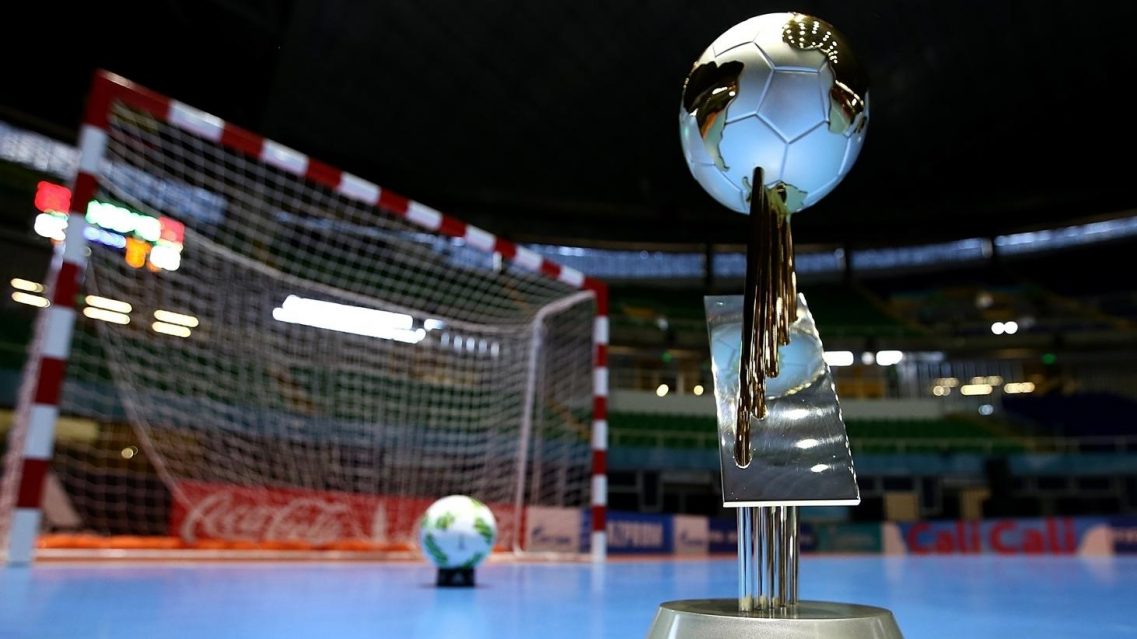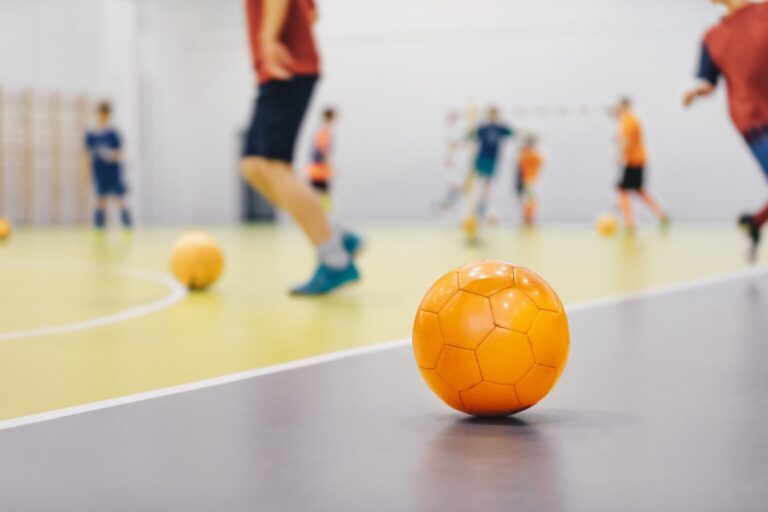Most football fans outside of Latin American countries will, at best, have an elusive idea of what futsal actually is. While there’s always been an understanding and popularity of casual indoor 5-a-side football games between friends, many are unclear about at when this becomes futsal.
Futsal is fast paced by nature and is designed to develop technical abilities, creative problem-solving skills in tight, congested spaces, and intelligence in the movement of off ball runs to receive the ball in better areas of the pitch. So, with no walls (unlike traditional 5-a-side) and a heavier ball, players are forced to take opponents on in individual battles, control the ball in congested spaces, and come up with creative solutions to the various problems this can bring when attempting to retain possession for your team.
Futsal is like a microcosm of the broader, world-renown sport. On a tighter pitch, players are exposed to more time on the ball in high-pressure scenarios, having to react to constant turnovers of possession and maintain high levels of mental and physical concentration in a sport that can change so rapidly. The technical and creative skills learned in futsal are easily transferable to 11-a-side football, meaning many countries in South America and Europe have placed emphasis on ensuring aspiring footballers partake in futsal training to aid their development.
Some of the most technically gifted football players in history, from Lionel Messi and Neymar to Diego Maradona and Pele, have learned their craft on the futsal court. So, with the prevalence of futsal in Latin-American footballing cultures and player development undeniable, let’s learn more about the history, rules, and essence of the sport.

Uruguayan origins
Uruguay dominated the footballing sphere in its early days, winning gold at the 1924 and 1928 Olympic Games, before triumphing at the first-ever FIFA World Cup in 1930. This spread a deep love of the football among Uruguayan people and a series of tactical innovations deployed by the nation’s leading coaches followed.
The people of Uruguay loved football so much that they ditched indoor court-based sports like Basketball and started playing football on the courts instead. Juan Carlos Ceriani, a director of YMCA Club, noticed this trend and decided these games played on courts needed a set of rules slightly different from football to ensure they were played with flow and quality.
Ceriani would name his new game futsal, a combination of the words “indoor”, “hall”, and “football” in Spanish.
Ceriani’s rules made use of the existing facilities available on courts; the goals would be the same size as what is used in handball, while the court would have the same dimensions as what is used in Basketball, meaning no new facilities had to be built for futsal to take off in Uruguay. Meanwhile, rules about where goalkeepers could handle the ball and interfere with play were influenced by water polo, making futsal a footballing combination of other already existing court and small-sided games, allowing players to understand and adapt to the game smoothly.
Futsal games were often played at a tempo too quick to be conducive for improving the ball control and spatial awareness of its players, so Ceriani introduced a heavier ball to help players stay in possession while in crowded areas of the court. Futsal games, with the introduction of the heavier ball, then had a greater emphasis on control and skill development and these benefits were noticed by neighbouring nation Brazil, who popularised the game and made it integral to the development of their young footballing prospects.
Futsal rules today
Fast forward to the present day and futsal has evolved to become the most rapidly growing indoor sport in the world. Futsal’s fast-pace, emphasis on technical prowess, and flow makes it an enthralling game to both play and watch.
The benefits futsal has on a player’s balance, dribbling, passing, and ball control skills have been noticed by football federations around the world, who look to implement the game into grassroots players training regimes to develop more technically gifted footballers, as seen in countries who’ve played the game for decades, such as Portugal, Spain, Brazil, and Argentina.
The game now has globally standardised rules and is recognised by UEFA and FIFA, giving nations the opportunity to compete in continental and global futsal tournaments. The first FIFA Futsal World Cup was hosted by the Netherlands in 1989, and Brazil went on to win its first of five Futsal World Cup wins.
With these standardised futsal rules, each team can have five players on the court at any given time and are enabled to make rolling substitutions. Games are 40 minutes long and split into two 20-minute halves; dissimilar to football, the ball is stopped each time the ball goes out of play, meaning there is no injury time at the end of games. Throw-ins, as seen in football, are replaced by kick-ins, with takers having just four seconds after having possession of the ball to restart the game.
Meanwhile, goalkeepers are forced to throw the ball at restarts instead of the traditional goal kick and, again, have just four seconds to restart play to prevent the risk of being penalised with a yellow card. Disrupting play with fouls, in general, are treated with higher levels of severity in futsal; should a team commit five fouls any given 20-minute halves, every subsequent restart is taken as a penalty from 10M outside of the goal, gifting the opposing team with a great opportunity to score.
The essence of futsal
These fluid rules are designed to ensure continuity and tempo in futsal games are maintained, eliminating the opportunity for time-wasting and gamesmanship which can, on occasion, ruin the spectacle of 11-a-side football matches. The rules of futsal mean the most technically and tactically skilful team usually win games, rather than the team that can successfully time-waste and see out games with physical dominance.
This is only enhanced by other aspects of the game. Ceriani’s traditional handball style goal size, for example, has been maintained to place emphasis on the striking player’s technical abilities and accuracy when striking for goal. Small goal size also results in less hopeful shots from distance, instead forcing players to skilfully work the ball up to a close range of the goal before shooting. Furthermore, the previously used heavy futsal ball in the early phases of the game in Uruguay has now been scientifically designed to have anti-bounce features, encouraging passing football and reducing the time possession is spent in contention for the ball.
So, as a result of these carefully designed rules and the curated cultural essence of futsal, games are typically high-scoring, entertaining, and encouraging fair play to be successful.
In which countries is futsal most popular?
Inventor of futsal, Juan Carlos Ceriani, may have struggled to believe that his football-derived court-based sport would take off in quite the way that it has. Lithuania’s 2021 World Cup had a total attendance of 63,748, while in 2014, a match between the Brazilian and Argentinian national teams was played in front of a record-breaking crowd of 56,483.
Brazil
Futsal is played, at least to some degree, in most countries where football has a general popularity among its people. However, some countries have embedded futsal into their countries more than others. None more so than Brazil, who, like in traditional football, have more World Cup wins and active participants than any other nation on earth. In fact, the South American footballing hotbed of talent possesses more active amateur futsal players than traditional football, and the game even has its own professional league in Brazil. This is largely due to Brazil’s geographical terrain making it difficult for grass to grow, meaning amateur games must be played in creative locations on the streets, in concrete cages, or on manufactured futsal courts.
It is thought there is a link between the Brazilian popularity and culture of futsal and street-style technique and the success of their men’s national football team. The silky samba skills deployed by the country’s greatest professional footballing talents on the world stage are reminiscent of what’s learned on the futsal court in their youths, giving the players a unique, creative way of playing and a technical advantage over most of their competitors at FIFA World Cup’s.
Spain
Other warm-climate countries, such as Spain, Portugal, and Indonesia, have also heavily adopted futsal. Spain actually has a higher number of futsal players per capita than Brazil and has triumphed in the FIFA Futsal World Cup on two occasions. Similarly, to the translation of success into traditional football seen in Brazil, futsal helped to train Spanish players with the necessary technical and mental attributes to successfully perform the tika-taka tactic, used by Pep Guardiola’s Barcelona team, who are widely considered the greatest to ever play the game, and the famous Spanish national that won three international tournaments between 2008 and 2012.
Futsal’s continuing growth and importance to professional football
As previously alluded to, football federations around the world have noticed the achievements of futsal-obsessed nations like Brazil and Spain and are attempting to emulate their success by greater integrating the court-based into their footballing infrastructure.
For example, as part of the English FA’s 2010 restructuring of how it views player development, coaching, after several dismal international tournament campaigns, it vowed to invest more money into futsal and encourage younger players to incorporate the game into their training regimes.
The English FA may finally be reaping the rewards of their investment, with several young Premier League talents emerging from the same Futsal club in Manchester in recent years.
Manchester United’s Kobbie Mainioo, a player whose elegance and manipulation of the ball has been described as slightly “un-English” by many in the media, is just one of many of the graduates that’s benefitted from Manchester’s upcoming futsal club.
Fifa futsal world cup 2024
It’s important to remember, however that while the Manchester futsal club is utilised by many of England’s top north-west academies, futsal isn’t just a mechanism for footballing development, but a whole other sport in its own right.
There are great rewards for players who remain faithful to futsal throughout their sporting careers. This September, the world’s greatest futsal players, many of whom having dropped out of elite footballing academies across the globe, will have the opportunity to fight for glory at Uzbekistan’s 2024 Futsal World Cup.

The possibility of winning international accolades, gaining global exposure, and being part of a month-long tournament based on technical skill is an opportunity most professional footballers miss out on, and so is seen is a worthwhile alternative for talents that miss out on forging a career in football.

